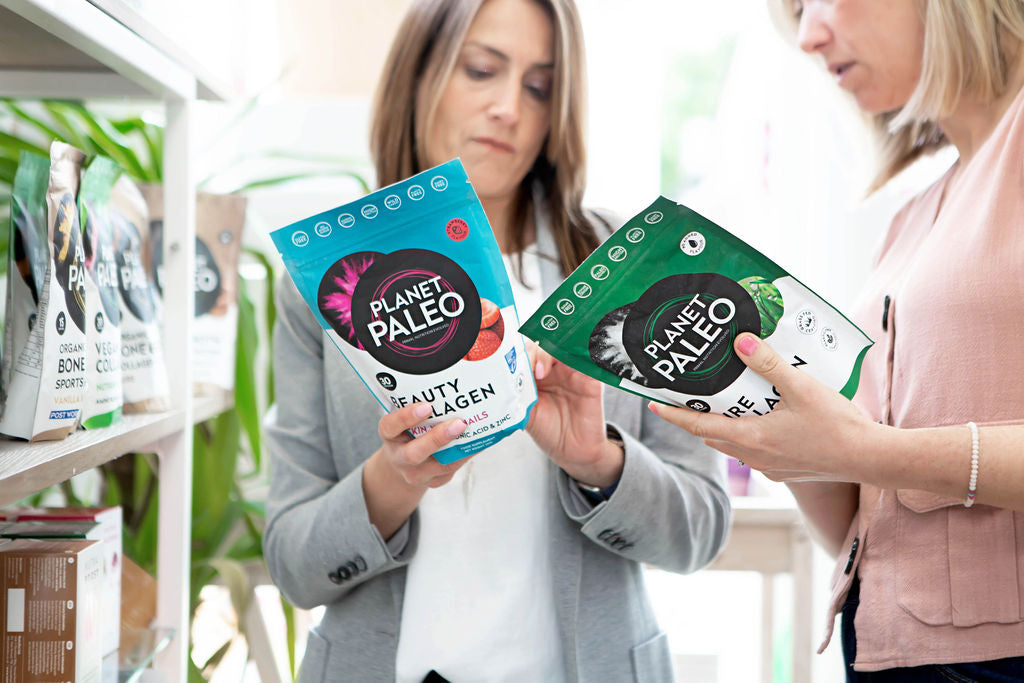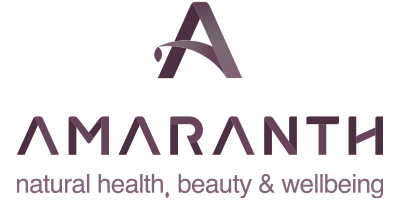Collagen Explained : Choosing Between Bovine, Marine and Vegan for your Health Goals

If you follow health trends, you’ve probably seen collagen popping up in conversations, recipes, and supplement shelves everywhere. But what exactly is collagen, and should you be adding it to your wellness routine?
What is Collagen?
Collagen is the most abundant protein in the human body. The name comes from the Greek word kolla, meaning glue – and that’s exactly what it is: the structural “glue” that holds us together. It makes up much of our gut lining, joints, bones, ligaments, cartilage, and skin.
Historically, our diets naturally included more collagen because we used to consume all parts of an animal — cooking and boiling bones, skin, and connective tissues into nourishing broths. Modern diets, however, rarely include these collagen-rich parts, and our body’s own collagen production also declines with age.
From Bones to Powder – How Collagen Supplements Are Made
When animal bones, hides, and connective tissues are cooked, collagen transforms into gelatin. Supplement companies take this a step further through enzymatic hydrolysation, breaking the gelatin into smaller peptides while keeping the amino acid profile intact. This process creates hydrolysed collagen (also called collagen peptides), which:
-
Dissolves easily in both hot and cold liquids
-
Is virtually tasteless and odourless
-
Is often easier to digest than gelatin
A daily scoop of collagen powder can help support the structural integrity, flexibility, and strength of your joints, tendons, ligaments, bones, and skin.
The Amino Acid Bonus – Glycine
One of collagen’s key amino acids is glycine, a non-essential amino acid (meaning our bodies can make it) that plays a huge role in connective tissue repair, gut health, detoxification, and nervous system support. Even though we produce glycine naturally, our needs often exceed what we can make ourselves — especially as we age or during times of increased physical stress.
Choosing the Right Collagen Source
When you’re buying collagen, the source matters. The three main types you’ll find are bovine, marine, and vegan (collagen alternatives). Each has its own benefits, making it easier to match to your needs and lifestyle.
Bovine Collagen – Joint, Bone & Skin All-Rounder
Source: Grass-fed, pasture-raised cows
Collagen types: Mainly Type I and Type III
Best for:
-
Joint and tendon support
-
Skin elasticity and hydration
-
Bone strength
-
Overall structural support
Why choose bovine collagen?
Bovine collagen offers a balanced profile for both skin health and connective tissue repair. It’s rich in glycine and proline, supporting joint recovery, gut lining repair, and healthy skin structure. When sourced from grass-fed, hormone-free, pasture-raised cows (like the Ancient and Brave and Planet Paleo range), you get cleaner, higher-quality collagen with more anti-inflammatory amino acids.
Marine Collagen – Beauty & Skin Specialist
Source: Wild-caught, sustainable fish
Collagen type: Primarily Type I
Best for:
-
Skin hydration and firmness
-
Hair and nail strength
-
Fine lines and wrinkles
-
Faster wound healing
Why choose marine collagen?
Marine collagen peptides are slightly smaller than bovine collagen peptides, meaning they can be marginally better absorbed. Type I collagen is the main type found in skin, so marine collagen is often chosen for beauty-from-within goals. Purity and sustainability are very important when choosing a marine collagen due to the toxins in our waters. Bare Biology specialise in sustainable, certified marine supplements and so their Skinful marine collagen is our recommended product.
Vegan Collagen (Alternatives) – Plant-Based Support
Source: Not true collagen (which only exists in animals), but blends of amino acids, vitamin C, zinc, and plant extracts to support your body’s own collagen production.
Best for:
-
Those following vegan or vegetarian diets
-
Supporting natural collagen production
-
Antioxidant and nutrient support for skin and joints
Why choose vegan collagen?
While plants don’t contain collagen, they can supply the building blocks and cofactors your body needs to make its own — for example, vitamin C, silica, and protein-rich plant sources. Vegan collagen boosters can be a great option for supporting skin health and joint integrity without using animal products.
Which One is Right for You?
-
For overall joint, bone, and gut health: Go for bovine collagen.
-
For skin, hair, and beauty benefits: Try marine collagen.
-
For plant-based lifestyles: Choose a vegan collagen booster with amino acids and cofactors.
Whichever you choose, consistency is key — collagen benefits are seen over weeks to months of daily use. Look for clean, responsibly sourced products to get the best results for both you and the planet. Want to know the best collagen products available in the UK? Our nutritional therapists have done their research and can reveal the results our blog - check it out here.
